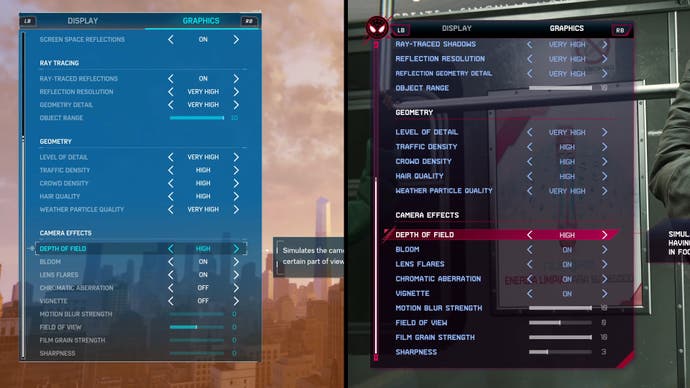Marvel's Spider-Man: Miles Morales PC is another stellar Sony port
Ray tracing upgrades detailed, optimised settings supplied.
Marvel's Spider-Man: Miles Morales is a lot like the expansion pack of old: the same characters, a new story, a visual revamp and a small dose of new technology. For the PC version of the PS5 launch game, developer Nixxes builds on all of the great work it did with its port of Marvel's Spider-Man Remastered, the new release benefiting from the various optimisations and revisions made over time - while the addition of ray-traced shadows adds further to the PC version's already impressive upgrades over the PS5 version.
As it's built on the same fundamental technology, the game runs much like Remastered - and has the exact same recommended system specifications. However, there's an argument that city performance may be marginally improved (I measured a circa five percent increase) but that's likely down to the revamped winter city, with the small changes to art this entails - like the lack of leaves on the trees, for example.
In putting together optimised settings and the PlayStation 5 comparisons you'll see in the embedded video below, the changes Nixxes has made allow me to get a better lock on what some of the settings actually do - and now all of them actually seem fully functional. It wasn't clear what crowd and traffic density settings actually did at the launch of Marvel's Spider-Man Remastered, but now they do seem to work - as does the HBAO+ ambient occlusion alternative to the SSAO solution ported over from the PlayStation code.
Another key optimisation comes in the form of better utilisation of a video card's VRAM, rolled out a while back in Remastered and implemented 'out of the box' in Miles Morales. Right now, if you are on an 8GB GPU or more and playing at 1440p using optimised settings, my advice would be to set texture quality to very high - but drop it back to high if using a 4K output. Failure to do so can lead to some big performance drops if ray tracing is enabled.
You can see how optimised settings play out compared to the closest PlayStation 5 equivalents in the table below - and I'd recommend these settings for anyone using one of today's mainstream RT-capable graphics cards. Owing to CPU limitations more than anything, I'd recommend a 60fps target for a mainstream PC with a Ryzen 5 3600 class CPU. Optimised settings should keep you in the region of 60fps for the vast bulk of play, while your scaler of choice (DLSS, FSR2, XeSS, Insomniac IGTI) can be linked to dynamic resolution scaling to ensure smooth, consistent performance.
For those with RTX 4000-class GPUs, DLSS 3 frame generation is also supported - and the good news is that Nvidia's latest driver opens the door to full G-Sync support. Previously, forcing on v-sync in the control panel would cause big latency issues, while leaving it on per Nvidia's recommendation would cause tearing outside of the G-Sync supported frame-rate window. In my tests, the latency difference between a capped 116fps on a 4K 120Hz display (48ms) and a fully unlocked, fully tearing 151fps (43ms) is just 5ms. On the maxed settings worthy of the RTX 4090, DLSS 3 frame generation is the only way to consistently play at north of 100fps, owing to the game's startling CPU requirements with all bells and whistles enabled. Nvidia's new driver-level G-Sync/V-Sync fix resolves my biggest issue with the technology and I'm really looking forward to seeing how DLSS 3 scales onto lower-end RTX 4000 cards where the frame amplification effect will be more pronounced.

| Optimised Settings | PS5 Fidelity Mode | PS5 Performance RT Mode | |
|---|---|---|---|
| Texture Quality | High/Very High* | Very High | Very High |
| Texture Filtering | 8x | 4x | 4x |
| Shadow Quality | High | High | High |
| Ambient Occlusion | SSAO | SSAO | SSAO |
| Screen-Space Reflections | On | On | On |
| RT Reflections | On | On | On |
| RT Shadows | Off | Off | Off |
| Reflection Resolution | High | High | High |
| Resolution Geometry Detail | High | High | High |
| Object Range | 6-8** | 10 | 7-8 |
| Level of Detail | High | High | High |
| Traffic Density | Very Low | Unknown | Unknown |
| Crowd Density | Very Low | Unknown | Unknown |
| Hair Quality | Medium | High | Medium-High |
| Weather Particle Quality | High | High | High |
| Depth of Field | Low | Medium/High | Medium/High |
* Very High for 8GB GPUs at up to 1440p resolution, High for 8GB GPUs at 4K
** Object detail 6 for CPUs with Ryzen 5 3600-class performance, 8 for higher performance CPUs
Moving onto the new technology in Miles Morales, Nixxes boosts the RT feature set still further with ray-traced sun/moon shadows - an upgrade I hope to see retrofitted to Marvel's Spider-Man Remastered in due course. It's not an essential upgrade and as you'll see in the video, enabling it requires a good degree of CPU and GPU overhead, but I'd say that nine times out of ten it offers a nice quality improvement over the game's standard shadow solution.
A wealth of additional objects gain shadows that simply aren't there otherwise, while the range of objects casting shadows dramatically increases - everything from pedestrians and cars in the distance right down to grass and bushes directly in front of you gain shadows that were not previously there. The quality of those shadows also accurately reflects the way they work in real life: sharp when close to the shadow-casting object, more diffuse the further away from the player. The sudden shift in shadow quality at a distance - the cascade - also disappears with RT shadows enabled.
It's not the complete solution though and there are edge cases with RT shadows don't quite work. Shadow maps are 'baked' and reflect the highest quality world detail, while RT shadows are derived from lower quality geometry, so can - very occasionally - look worse than the standard alternatives. I also noticed that in standard view, tree shadows can animate, while the RT shadows do not.
Another issue I have seen occasionally is that the alpha cards making up tree branches are sampled in RT shadows as being opaque, so very occasionally, some tree shadows can present with ugly, visible triangles - there's a shot of that in the gallery above. It's not a massive issue, but I think Nixxes could introduce a super-high level geometry structure option that would alleviate most of these issues.
In the end, I do not recommend RT shadows for inclusion in my optimised settings as they are costly on the GPU, costing 15 percent in performance on an RTX 2070 Super running at 1440p just on the medium setting. More important is the CPU cost, where the Ryzen 5 3600 sees a nine percentage point performance hit, putting your locked 60fps in jeopardy. Consider this a luxury option for those with high-end kit.
At this point, Nixxes has mostly nailed its Spider-Man ports (no #StutterStruggle here) but there is one final bugbear that needs addressing: obvious texture pop-in, something that occurs regardless of your hardware's capabilities. Beyond that though, once again, Nixxes deserves kudos for the quality of its ports and its dedication to delivering a great experience to a vast range of different PC hardware, from Steam Deck all the way up to the latest RTX 4090-equipped high-end rigs. It's great to see a developer unconstrained by the consoles, delivering serious upgrades over an already impressive PlayStation 5 release. As such, Marvel's Spider-Man: Miles Morales on PC comes highly recommended.


















